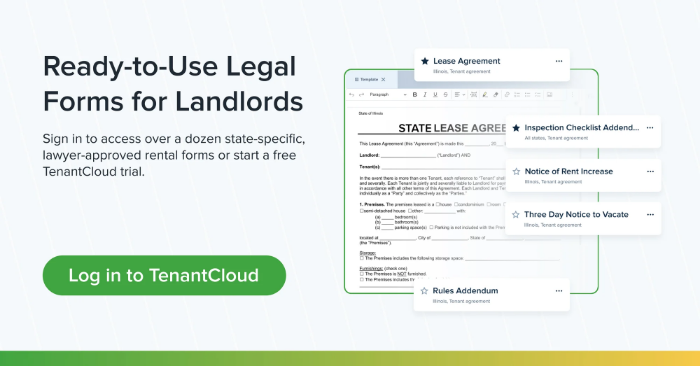
Getting to know Pennsylvania’s eviction process can feel overwhelming, especially if you’re new to the experience. While eviction laws vary from state to state and county to county, adding to the complexity, the process is similar across the board:
- Send a written notice
- Fill out a complaint
- Serve the tenant
- Attend a trial
- Final hearing
A positive landlord-tenant relationship will help avoid an eviction scenario and at the very least, make the eviction process easier if it gets to that point. But even after careful communication and thorough screening, sometimes evictions are unavoidable.
No matter where you’re at in your landlord journey, we hope this guide provides everything you need to know about evictions in Pennsylvania, including how evictions work, what a lease agreement is, and reasons to evict so you can feel prepared and confident.
Let’s get started.
Understanding Evictions in Pennsylvania
What do we mean when we say eviction? An eviction is a legal process allowing a landlord to lawfully remove a tenant from their property. A landlord will usually evoke this process when a tenant does not comply with the terms outlined in their lease agreement, fails to pay rent, or other conditions that may warrant an eviction.
Yes, it’s true that the landlord technically owns the rental property, but they cannot evict a tenant without going through the legal process first. It’s not lawful for a landlord to force a tenant out by changing the locks, turning off utilities, removing doors, etc.
Reasons to Evict
In Pennsylvania, a landlord can’t break a lease agreement without reason. These are the most common reasons for eviction in Pennsylvania:
- Failing to Pay Rent: If a tenant falls behind on rent even by one day, the landlord can give the tenant a written ten-day Notice to Quit. If the tenant doesn’t pay within those ten days, the landlord can start the eviction process.
- Non-Renewal of a Lease: If a tenant’s lease has expired without the landlord renewing it, the tenant must move out at the end of their term. If they choose to continue occupying the property without the landlord's consent, the landlord can initiate eviction.
- Lease Violation: If a tenant violates any conditions in their lease agreement, such as damaging the property, causing a disturbance, or keeping unapproved pets, the landlord can proceed with eviction.
- Criminal Activity: If the tenant commits criminal activity on the property, the landlord can evict the tenant with a shorter notice than usual.

If you’re a landlord, providing your tenants with a written eviction notice before you begin the eviction process is not only part of the process, it also helps show your compliance with the law.
Importance of a Lease/Rental Agreement
Usually signed at the beginning of the lease, a rental agreement outlines the terms and conditions the landlord and tenant are expected to follow during the rental period. These terms help maintain a positive landlord-tenant relationship while protecting both parties' rights.
As mentioned above, if a tenant violates these terms and conditions, such as smoking in a non-smoking property, the landlord can evoke an eviction. (In case this happens to you, here’s our guide to removing smoke odor from your home.)
Tip: If you need help creating a reliable lease agreement, see our guide on lease documents for landlords, where we go a bit more in-depth.
Recommended Eviction Notices
The type of written notice the landlord gives to the tenant will depend on the reason for eviction, the lease timeline, and the lease agreement itself. The notice must contain the reason for eviction, the time expected to fix the situation, and the day the tenant should move out if the situation is not rectified. These notices include the following:

10-Day Notice for Non-Payment of Rent
Non-payment of rent is the most common cause for eviction. If tenants fail to pay, landlords can issue a 10-day notice to quit, which communicates to the tenant that they have ten days to pay the overdue rent. If the tenant does not pay, the landlord can start eviction.
30-Day Notice for Annual Leases
With a yearly lease term, a landlord must provide a 30-day notice to vacate. This notice informs the tenant of the landlord's intention not to renew the lease agreement. If the tenant does not vacate the rental by 30 days, the landlord can initiate eviction proceedings.
7-Day Notice for Month-to-Month Leases
Pennsylvania law requires landlords to provide a 7-day notice to terminate the lease for month-to-month agreements. This notice should specify the date the tenant should leave the property. If the tenant does not vacate by the given date, the landlord can start an eviction.
2-Day Notice for Week-to-Week Lease
With week-to-week lease agreements, a landlord must provide a 2-day notice to end the lease. If the tenant does not leave by the date specified, the landlord is free to begin an eviction process.
The Eviction Process in Pennsylvania
Evictions require patience, diligence, and a thorough understanding of how the process works. Here’s what it looks like, step by step, in the Keystone State.
1. Provide Notice to the Tenant
The first step in the eviction process is to give the tenant a written notice. The type of notice provided will vary on the tenancy length. For week-to-week tenants, a 2-day notice is required; month-to-month tenancies require a 7-day notice, and yearly terms require a 30-day notice.
This step gives the tenant time to fix the situation (such as paying the past-due rent), or they can move out of the property ahead of time to avoid dealing with an eviction. The written notice should provide the reason for eviction and how long the tenant has to fix the issue or vacate.
2. File a Complaint in Court
If the tenant fails to fix the situation within the expected time period, the landlord can then file a complaint in the justice court associated with the rental. This process typically happens in a small claims court. The landlord must fill out a complaint form and pay a filing fee (typically $90 to $150, depending on the area.)
3. Serve the Tenant with the Complaint
Next, the tenant is served the court documents after they’ve been filed, which typically include a Summons and Complaint. In Pennsylvania, the landlord cannot serve the tenant. A sheriff or authorized individual must serve these documents. The date and time of the eviction hearing will be included, so the paperwork must be delivered within five days of the hearing.
4. Attend the Court Hearing
Tenants in the state of Pennsylvania aren’t required to respond to schedule a trial. However, they should attend the hearing to present their side. At the hearing, a judge or magistrate calls the cases, gathers testimony from the landlord and tenant, and makes a decision.
5. Eviction Steps are Initiated
If the court favors the landlord, the eviction process enters its final stage. After the appeal, the landlord can obtain a Writ of Possession from the court, allowing permission to have a sheriff remove the tenant within a specified timeframe.

Rights and Protections
Understanding landlord and tenant rights can help landlords remain fair in the process as well as save any legal hassle down the road. For tenants, knowing your rights means avoiding unfair treatment in the event of an unwarranted eviction. By following the eviction process, both parties are protected and an agreement can be made in the smoothest manner possible.
According to the Housing Equality Center of Pennsylvania, tenants can be at risk of eviction anytime they miss rent or fail to comply with the lease agreement; however, the landlord does not have the right to take measures into their own hands.
Tenants also have a right to keep their belongings during the eviction, although if the tenant fails to pick up their belongings after ten days of being notified by the landlord, the landlord can begin charging the tenant a fee for storage.
Resources for Landlords
As a landlord, it’s important to utilize the tools and resources that can help you stay organized and compliant. This means keeping documentation of all rent payments, lease agreements, and anything else important to the situation.
It’s a good idea to thoroughly screen each tenant before they move in to help reduce the chances of missed payments or violations. (Tip: You can run background and finance checks on tenants directly in our platform on TenantCloud.)
If you find yourself initiating an eviction and need specific law advice, reach out to an attorney specializing in Pennsylvania laws.
Conclusion
When it comes to being a landlord, it’s more than just managing properties—managing relationships is part of the package. The more you can understand eviction laws in Pennsylvania, the more you can maintain a positive, respectful landlord-tenant relationship.
Try TenantCloud
TenantCloud, takes the hassle out of property management, helping you screen new tenants, communicate thoroughly, and keep records during an eviction. Let us help you navigate your rental business with confidence so you can have more time building your business or doing the things you enjoy most.
___________________________________________________________________________
Disclaimer: TenantCloud does not provide legal advice. This content is for informational purposes only and should not be considered legal guidance. Users are responsible for reviewing all applicable local, state, and federal laws and consulting a qualified attorney with any legal questions.
___________________________________________________________________________


